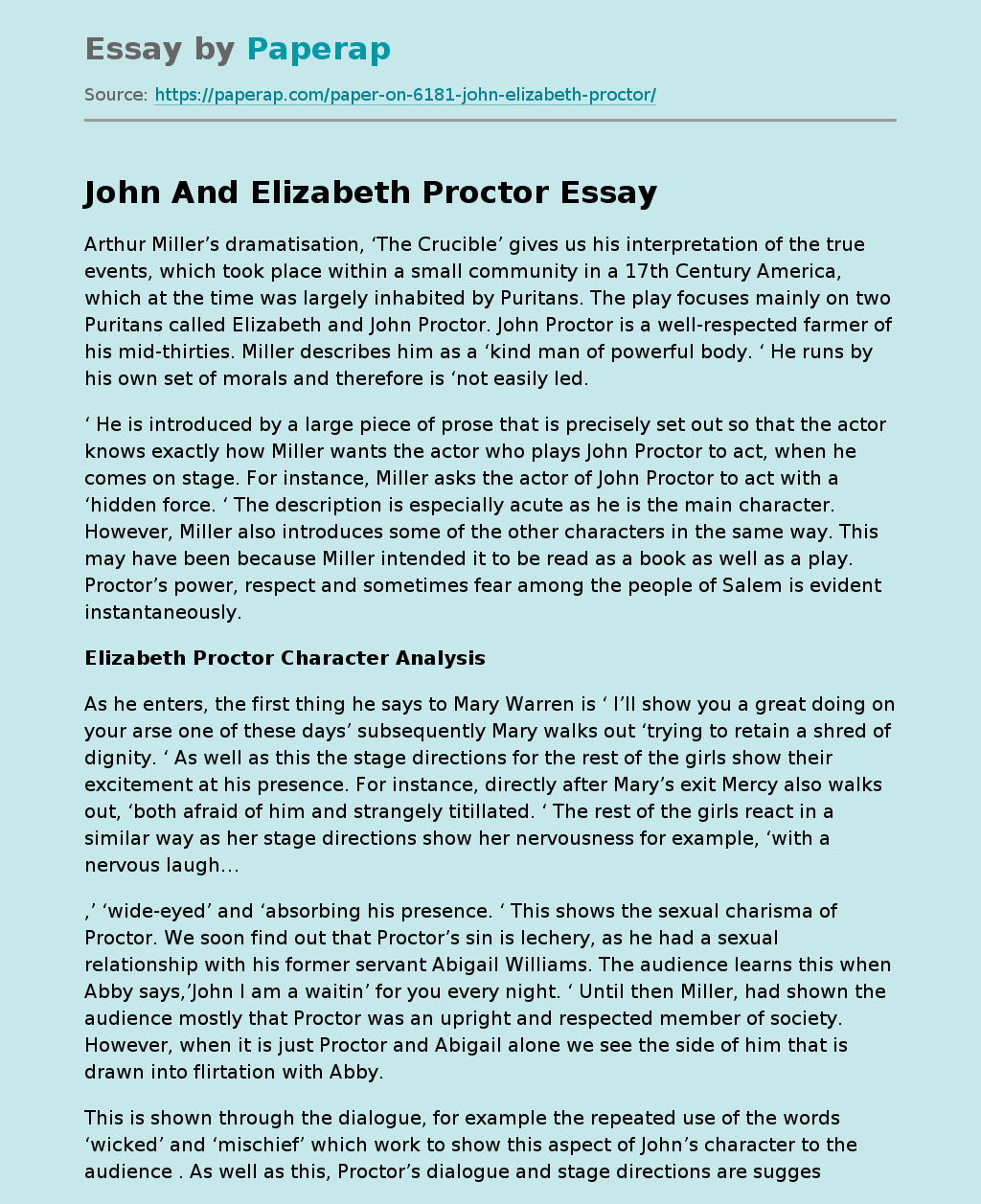John And Elizabeth Proctor
Arthur Miller’s dramatisation, ‘The Crucible’ gives us his interpretation of the true events, which took place within a small community in a 17th Century America, which at the time was largely inhabited by Puritans. The play focuses mainly on two Puritans called Elizabeth and John Proctor. John Proctor is a well-respected farmer of his mid-thirties. Miller describes him as a ‘kind man of powerful body. ‘ He runs by his own set of morals and therefore is ‘not easily led.
‘ He is introduced by a large piece of prose that is precisely set out so that the actor knows exactly how Miller wants the actor who plays John Proctor to act, when he comes on stage.
For instance, Miller asks the actor of John Proctor to act with a ‘hidden force. ‘ The description is especially acute as he is the main character. However, Miller also introduces some of the other characters in the same way. This may have been because Miller intended it to be read as a book as well as a play.
Proctor’s power, respect and sometimes fear among the people of Salem is evident instantaneously.
Elizabeth Proctor Character Analysis
As he enters, the first thing he says to Mary Warren is ‘ I’ll show you a great doing on your arse one of these days’ subsequently Mary walks out ‘trying to retain a shred of dignity. ‘ As well as this the stage directions for the rest of the girls show their excitement at his presence. For instance, directly after Mary’s exit Mercy also walks out, ‘both afraid of him and strangely titillated.
‘ The rest of the girls react in a similar way as her stage directions show her nervousness for example, ‘with a nervous laugh…
,’ ‘wide-eyed’ and ‘absorbing his presence. ‘ This shows the sexual charisma of Proctor. We soon find out that Proctor’s sin is lechery, as he had a sexual relationship with his former servant Abigail Williams. The audience learns this when Abby says,’John I am a waitin’ for you every night. ‘ Until then Miller, had shown the audience mostly that Proctor was an upright and respected member of society. However, when it is just Proctor and Abigail alone we see the side of him that is drawn into flirtation with Abby.
This is shown through the dialogue, for example the repeated use of the words ‘wicked’ and ‘mischief’ which work to show this aspect of John’s character to the audience . As well as this, Proctor’s dialogue and stage directions are suggestive. A good illustration of this is ‘his smile widening’ and ‘ah you’re wicked yet aren’t y’. ‘ Miller skilfully creates an atmosphere in which we see Proctor having pressure piled onto him by Abigail. The reader and audience can see this clearly as the words to do with pressure are repeated.
For instance, ‘I have a sense for heat, John’ and ‘burning in your loneliness. ‘ It’s clearly evident that Abby’s words have some truth as she manages to put so much pressure on him that he eventually admits he ‘thinks of [her] softly from time to time. ‘ The two sides to John Proctor are clearly shown. Abigail does well to put John under pressure until she mentions Elizabeth, at which point John recoils and ‘angered-at himself’ he says, ‘you’ll speak nothin’ of Elizabeth. ‘ John’s battle with desire is also shown earlier on, in the words ‘burning in your loneliness.
‘ The tension that is built up is shortly released from Proctor, when he ends up shaking Abigail. Had Abby not mentioned Elizabeth the tension may have been released in a way that fitted with Abby’s flirtatious intentions. However, the minute Elizabeth’s name is mentioned, this is like a catalyst, bringing John to his senses and begins to show us the battle that is taking place within John. Elizabeth never actually appears in act one instead she is somewhat mentioned by Abigail. She is described as a ‘sickly wife’ and a ‘cold and snivelling woman. ‘
John And Elizabeth Proctor. (2019, Dec 05). Retrieved from https://paperap.com/paper-on-6181-john-elizabeth-proctor/

